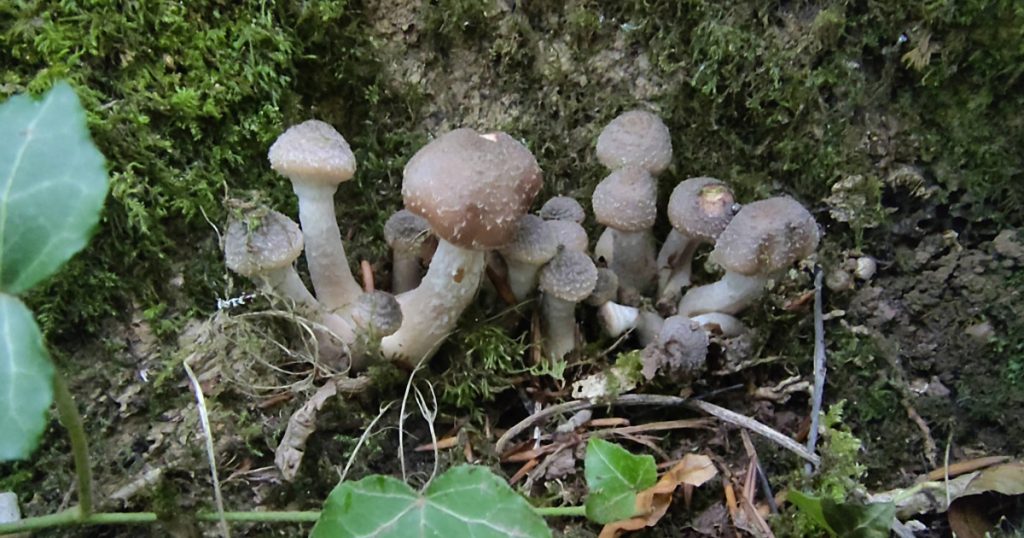I’ve been reading a lot about fungal fiction and the fungal turn recently. It gets to a point where it’s weird to be inside reading about mushrooms when there are actual mushrooms outside. Accordingly, I’ve been fungi spotting whenever I’ve been out, and even going on mushroom walks specifically to look for them.
Continue reading “Mushroom Diary: Autumn 2025 in Photos of Fungi”Just Utopias Blog
Current Research in Speculative Fiction (CRSF) 2025 conference report
The CRSF annual conference took place on 3-4 July 2025. It was a hybrid event and I joined remotely. The official theme of the conference was ‘boundaries’. However, I felt there were two other themes that emerged from the event. Firstly the global prevalence of SF, which the hybrid format supported as it allowed for attendees from around the world. Secondly, fungal fiction, a current favourite topic of mine.
Continue reading “Current Research in Speculative Fiction (CRSF) 2025 conference report”Fungal fiction: a field guide to the mushroom trend in speculative fiction

Mushrooms are a big thing right now in speculative fiction. I’ve enjoyed putting together this glossary of terms relating to fungi and the trend for fungal fiction. I wrote this in response to Jasmin Kirkbride’s keynote on mushroompunk at the Current Research in Speculative Fiction conference in July 2025.
Continue reading “Fungal fiction: a field guide to the mushroom trend in speculative fiction”“The constellations were at our feet this whole time”: We Feed The UK’s earthy utopias

What’s the crossover between land work and utopia? I feel there is one, although it’s hard to articulate. Isn’t utopia science fiction, set in not-real places with fictional technology? How can that relate to working the land?
Well, increasingly utopian fiction is earthbound, with characters whose physical connection with the earth go beyond our own. Think the orogenes in N. K. Jemisin’s Broken Earth trilogy who manipulate seismic energy, and Vern in Rivers Solomon’s Sorrowland whose fungal “passenger” enables her to communicate through mycelial networks.
Then there is movement the other way, too. I recently visited the We Feed The UK exhibition across the Royal Photographic Society and Martin Parr Foundation galleries at Paintworks in Bristol. This project brought photographers and poets to farms across the UK who are growing agroecologically, eschewing intensive farming methods. Viewing the exhibition, it was clear to me the photographers and poets had seen hope in these places and were conveying this through their work.
What follows is my review of the exhibition, with a focus on the latent utopianism within its celebration of the “custodians of soil and sea”.
Continue reading ““The constellations were at our feet this whole time”: We Feed The UK’s earthy utopias”Behind the scenes for an upcoming video

Let me take you behind the scenes on the video I recorded this morning for the upcoming Current Research in Speculative Fiction conference. It looks like this: a phone mount, attached to a GorillaPod, attached to some ivy, attached to a tree.
Continue reading “Behind the scenes for an upcoming video”Decolonial researcher training – some thoughts

Last week, in the council chamber within the main building of Cardiff University surrounded by portraits of venerable white men, I attended a day long workshop on decolonial research led by Dr Leon Moosavi. As I embark on my PhD I am interested in what it takes to do the day job in a way that embodies the decolonial ideals of the utopian fictions I am studying, so that my research can work towards the same aim.
Continue reading “Decolonial researcher training – some thoughts”The living rock: dispatches from a cave
We went on a family trip to Cheddar Gorge and Caves and I was, like most visitors who have been in the show caves over the past 187 years I’m sure, very impressed by the rock formations. What I was particularly impressed by was their semblance to other things in nature I would usually think of as alive.
I know, and knew before I stepped inside the caves, that over a long enough timescale rock is dynamic. In terms of visualising this, I would have thought of lava, or rocks being eroded over time, or even water dripping over rock to form stalactites and stalagmites. But seeing the organic forms of the rocks within the caves made me think more about rock as a living thing.
Continue reading “The living rock: dispatches from a cave”Women in the Black Fantastic conference report
A word at the outset of this report to note there will be spoilers for the Broken Earth trilogy by N. K. Jemisin. Also, this report is not comprehensive. Conversely, it is highly subjective and reflects what I personally found exciting and pertinent to my own areas of interest. This means mostly Jemisin, Nisi Shawl and Rivers Solomon, utopia, visionary fiction and decolonisation. As you’re reading the Just Utopias blog you’re hopefully here for this, so let’s crack on.
Continue reading “Women in the Black Fantastic conference report”My new publication on The Word for World is Forest by Ursula Le Guin
Following the The Word for World is Forest symposium, I was invited to turn my presentation into a full length article for The Acorn journal. I’m pleased to say this is now available online.
Continue reading “My new publication on The Word for World is Forest by Ursula Le Guin”Is utopia more or less relevant since Trump’s re-election?
Waking up to the US election result was depressing for many reasons, but the one I’ll talk about here is the stark contrast between the progressiveness I see in contemporary American utopias and the fact that in reality, more than 75 million Americans voted for Trump.
Continue reading “Is utopia more or less relevant since Trump’s re-election?”